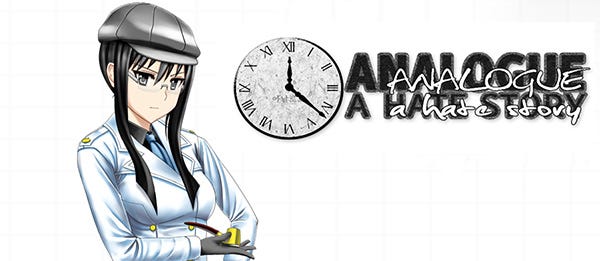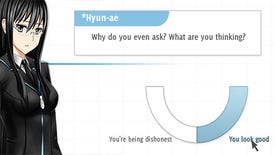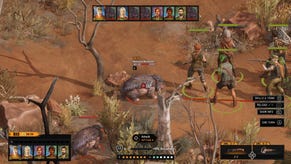Wot I Think - Analogue: A Hate Story
This is not a love song
Analogue: A Hate Story, the latest game from Digital: A Love Story and Don't Take It Personally, Babe creator Christine Love, came out a few weeks back. I've finally been able to sit down and explore this dark, sad detective story set on a ghost ship from the 25th century. Here's what I discovered.
CHOOSE:
I will not play a game that has that art style.
Okay! We can continue.
You could technically call Analogue: A Hate Story a visual novel, but that would be a little like saying a panther was 'just a cat.' Analogue doesn't so much evolve the largely linear, information drip-feed structure of visual novels as mutate it wildly, chop it up into chunks then offer it up to you in a tin you can pluck the parts out of as you like. It's a detective story first and foremost, with you as the detective. A sort of space-Poirot if you like, but one whose only forms of communication are picking a left or a right answer to someone else's questions, rather than Belgian bon-mots and moustache-stroking.
In the far future, you're contracted with finding out what fate befell the starship Mugunghwa before it reached its intended goal of establishing the first interstellar human colony. The only entity aboard the ship is an AI in the form of a young woman, who can't see or hear you, but only recognise which of her offered dialogue options you select. The rest... well, the rest is mighty tricky to document without plunging heavily into spoiler territory, as the game is a densely interwoven mystery revealed by browsing through the diaries and letters of its long-dead inhabitants.
The tale primarily revolves around two families of Korean extract, each of which was at one point seen as noble bloodlines among the population of indeterminate but apparently vast size on board the colony ship. How does their history of arranged marriages, quests for heirs and inter-familial arguments tie into the fate of the Mugunghwa?
There is a set explanation and there are scripted events and discoveries, but both your route to the key answer and your choices in reaction to it ensure a game that does not roll down a traditionally linear path. You build a picture of what happened to, but most of all what motivated, the major players in this centuries-old dynastic saga. You will be presented with justifications for why some people did what they did, and then you will decide where the guilt for the slow-motion tragedy that led to the ship's downfall really lies.
It's not truly a science-fiction piece, however. The death of the Mugunghwa's population is essentially a framing device for an acutely close-up look at a society that believed men are born to rule and women are born to obey. That is not a fictional society: Analogue's gradually-revealed backstory is based upon Korea's five centuries-long Joseon Dynasty, and particularly its shocking oppression of women. On the ship, before everyone died, its female populace were little more than slaves and breeders, with their only meaningful communication conducted via private letters.
It's these that you gradually dig up and read broadly in an order of your choice, discovering the desperate lengths to which the two families went to in order to protect themselves and express themselves - and the lengths the men went to in order to protect their own standing in the ship/dynasty's hierarchy. As well as that, you go far beyond the cold, simple family trees you're presented with at the start of the game, the swamp of unfamiliar names gradually clearing to reveal familiar voices and the darker truths behind the apparent relationships they document.
Analogue starts out as a mystery in more ways that one. In the earlier moments of its 3-4 hour playtime, it's barely clear what you're trying to do, let alone who all these people you keep hearing about are. Moments of open exposition are few and far between, but between the diaries, comments upon them from the AI and then cross-referencing those with the comments of another AI that turns up later, understanding builds itself.
Regularly, the game will pull out and remind you of why you're there - to find out what happened to a spaceship. A spaceship that, as you'll discover, isn't exactly in great shape after centuries of drifting through the skies, which makes your being on it not entirely wise. Thing is... you're now there for another reason.
At one point, the girlish, lonely AI asks why you're there - to find out the password that will get you the access you need to the ship's logs, or to find out more about the thoughts and fate of one of the characters you've been reading about. An hour previously, I'd have said it was for the password, but that point I'd become so invested in all these unseen, long dead people, their centuries-old machinations and aspirations and whether the women ever saw a brighter day, that my answer had entirely changed.
This wasn't a job anymore, or even a challenge to beat the game, get the information I needed and get an ending screen. It was personal. Personal even though I could only ever be an observer - it was dozens of decades too late to help, defeat or even meet any of these people. All I could do was pick left or right from options offered by a computer that looked like a manga character.
Opportunities to become more involved, emotionally if not practically, are offered, but that's all I can safely say about that. At times, there is a slight lean towards mawkishness if you head down a particular path, but fortunately it never escapes the shadow of something very sinister. There is the possibility to finally bring some light onto this dark ghost ship, but what if doing so entails the exoneration of something awful?
Opportunities to act brutally also exist, though at the time of writing I've seen only two of the game's five endings and so can't entirely speak for what happens were I to don my Utter Bastard, Utilitarian or Icily Pragmatic hats. I'd find that difficult to do, because certain characters elicit enormous, enormous sympathy from me even despite occasionally irritating jabbering-style dialogue. Because I'm a big softie. Even when being so involves essentially waving away the most awful crimes.
While Analogue is a tighter affair in both tale and design than last year's Don't Take It Personally, Babe (and mercifully free from the awkward didacticism that lay at the game's conclusion), the moments when you yourself are brought more directly into the tale are perhaps less powerful than the silent discovery aspect, but they're probably necessary to ensure this is more than a game of reading. The art, even aside from arguments about its divisive style, arguably harms it a little too, as the bright, colourful inhumanity with which the visual characters are depicted doesn't necessary gel with the scenes of silent suffering conveyed by the diaries.
Fortunately, the escalations of and experiments with the visual novel form (and indeed Digital's design) make up for this, transforming Analogue into a many-layered onion of a narrative. It is inevitably headed in one overall (yet splintered) direction, whose full story only becomes clear as a result of your own deduction and reasoning, and of multiple playthroughs. Oh, and you even get some well-observed (in its deliberate slowness and frustration) pseudo-Linux terminal action to try and stave off a mid-game disaster.
Analogue is the missing link between visual novels and adventure games, with a touch of RPG-style NPC relationship-juggling thrown in, and while I suspect it's more a glorious aberration than a watershed moment for a genre many gamers have quite understandably struggled to understand the appeal of, it's certainly a great leap forwards for Christine Love. Yes, I do personally question the wisdom of using that visual style, on both a commercial level and in terms of atmosphere, but, putting that aside, Analogue is a sit-up-and-take-notice achievement in storytelling, in interface, in research, in mechanics and in moral ambiguity.
It got into my head, and I suspect it's going to stay there for a while. I don't ask much more from a game.
Analogue: A Hate Story is out now.















